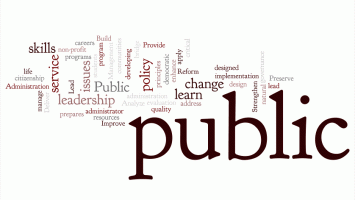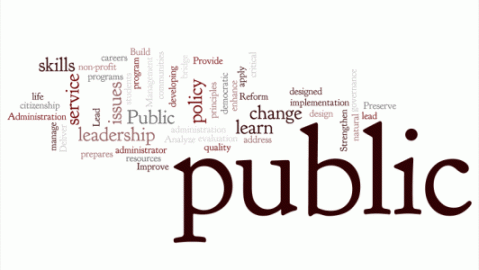Widgetized Section
Go to Admin » Appearance » Widgets » and move Gabfire Widget: Social into that MastheadOverlay zone
Connecting Education & Service
By Beth M. Renhaus, PhD.
Public service and education go hand in hand. In Mosher’s Democracy and the Public Service (1982), he asserts that “it is doubtful that there is any element in an evolving culture more significant for the nature of its public service than the educational system.” Educators have an important role in initiating the conversation of just how integral public service is to our future and how we can all strengthen public service together. We have the first step in recognizing potential public servants.
One of our main goals as educators is to prepare our students for their future by enhancing their skills, recognizing their abilities and  encouraging them to foster their creativity and knowledge into productivity.
encouraging them to foster their creativity and knowledge into productivity.
Berman, Bowman, West, and Van Wart (2013) suggest that young people often select careers in public service to make a difference in their communities. This reason for service is instrumental to achieving success in government, but often times it is not a reason that can be cultivated entirely in a MPA program. We must recognize those individuals who have a desire to serve and encourage them throughout their education.
It is the responsibility of educators to show students the importance of serving the public. We have an excellent opportunity to attract individuals to government in our classrooms. To take advantage of this opportunity, we should explain the important responsibility of leadership and working with the public. We should teach students to connect with those they serve: to understand the culture, to communicate and listen to others’ ideas, complaints and suggestions. Not only are we developing future public servants, we are beginning a greater conversation of how they can make a difference.
In the classroom, it is beneficial to invite public servants to speak to the students. The message that each of these public officials is delivering to young, impressible audience members is essential in cultivating an interest for public service. Not only do these guest speakers spark an interest in public service, they also give students a glimpse of public service in practice. They inform students of issues they may encounter on a daily basis. At the end of the speech, students can clearly recognize how they can make a difference.
 It is equally important to encourage students to complete internships or shadow public officials within local and state governmental entities. This allows students to engage in the process of making a difference and plan for their future. By experiencing public service in this way, students can actively pursue their goal of making a difference in many ways. Programs such as these help students practice the skills and abilities that they have recognized and developed in the classroom. By having public officials involved in the education process, we are coming full circle in terms of developing the workforce. Students learn from public servants, but the public servants often learn from these young aspiring public servants as well.
It is equally important to encourage students to complete internships or shadow public officials within local and state governmental entities. This allows students to engage in the process of making a difference and plan for their future. By experiencing public service in this way, students can actively pursue their goal of making a difference in many ways. Programs such as these help students practice the skills and abilities that they have recognized and developed in the classroom. By having public officials involved in the education process, we are coming full circle in terms of developing the workforce. Students learn from public servants, but the public servants often learn from these young aspiring public servants as well.
It is important to attract young people to public service early. If individuals value public service and have a sense of efficacy that they can make a difference in their communities, these individuals will be assets to public service with the proper cultivation of administrative skills offered in MPA programs. An individual who expresses a desire to serve will be motivated to accomplish goals and open to learn new, innovative techniques that can help to achieve their goals, which often focus on making the community a better place. Educators have a strong commitment to prepare and develop public servants.
An instrumental way to connect innovation and the creation of solutions among future public servants and experienced public servants is presently in use regionally and statewide. Many universities and organizations host public administration conferences annually. The key to making these events a learning experience for all and an instrument of motivation to learn further about public administration is broadening the agenda. When planning and preparing for these conferences, it is important to include a few elements that will reach a wide audience and engage others to participate.
In the planning efforts of a conference, it is important to include students at the undergraduate and graduate levels, practitioners, academicians, and public officials. By including and encouraging participation among these groups, we are acknowledging the importance of recognizing everyone’s perspective. Hosting a roundtable discussion led by public officials and public servants is an excellent opportunity for students to gain practical insight into issues public servants face in their communities and within their governmental structures. Through these open and honest discussions, we can also foster professional development among participants. These conversations may bridge innovative ideas for solutions to address issues that public servants face.
While many undergraduates may shy away from presenting academic work at such a conference, we should encourage them to volunteer, observe or become part of the conversation. In this way, they learn how public service can be an honorable career where individuals make a difference.
Beth Rauhaus is assistant professor at University of North Georgia. She can be reached at [email protected].






Follow Us!